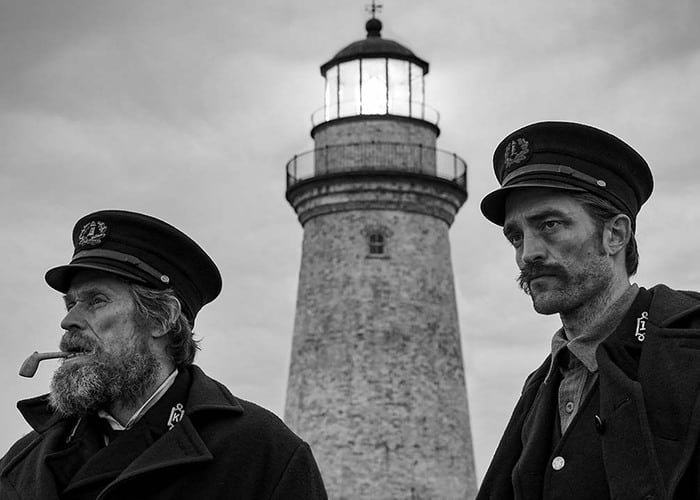
Writer-director Robert Eggers captured audiences with his original brand of gritty, pioneering horror in The Witch in 2015. Four years later, he’s made his terrifying sophomore debut in the Critics’ Week sidebar of the Cannes Film Festival with the utterly bewildering tale of two men toiling on an otherwise empty, unidentified island off the coast of 19th century Maine where the fog drifts heavy, and storms abound. It is the home of The Lighthouse they keep.
Willem Dafoe plays Thomas Wake, a salty, worn, rusty old man with a thick beard and a hint of insecurity for never having captained a ship, despite his role as the keeper of the lighthouse, what’s known as the “wickie.” Robert Pattinson plays Ephraim Winslow, an eager wage-earner, untied from a profession, but always chasing pay. His latest gig has landed him on the island undertaking grueling manual labor as the wickie’s right and only hand—shoveling coal, scrubbing floorboards, emptying buckets of shit, and the like.
They eat piles of seafood cooked by Thomas for dinner and work tirelessly throughout the day, the wind ceaselessly slapping their faces with rain. Thomas insists on having liquor (whiskey or rum, perhaps) every night, but Ephraim, in observance of the rules, won’t indulge, despite no one besides the rule-breaking Thomas being there to monitor him. They piss and shit in pails that sit between their beds and let them fill to the brim before emptying them out. They are the grimiest, grubbiest, crustiest maritime men you could imagine.
The film opens with an eerie shot of a boat gradually appearing out of a grey, grainy haze. The two men disembark and arrive on the island in silence, literally staring at us, the viewers, with a deep sense of duty, or disdain, or dissatisfaction. It’s hard to tell exactly what they’re channeling, and it’s even more challenging to determine what will come, but their gaze into the camera is imbued with a prescient sense of disorder and dread that will come to define the unpredictable events that unfold.
The first half foreshadows said dread through a mixture of booming sounds, looming storms, brooding mundanity, and dooming dialogue. The foghorn blares like a slow, aural strobe light assailing your eardrums. The roar of the waves crashing into the rocky island is interwoven with the incessant cackling of seagulls, those wretched rats with wings. Ephraim’s every chore is arduous and punishing, underscored by the slew of sounds adrift. The 35mm black and white cinematography is a bit menacing. Even the 1.19:1 aspect ratio contributes a foreboding tonality.
The two speak to each other naturally in old sea-torn poetics inspired by Herman Melville, Sarah Orne Jewett, and various sailor’s diaries, as the credits explain. Eggers’ use of this language is incredibly entertaining throughout, both titillating and hilarious. The two use phrases like “begrimed and bedazzled.” They say, “The damp’s got to the provisions” instead of “The food is wet,” and “Find some winks ‘fore the day draws further on” instead of “You should take a nap.” At the outset, Thomas fiercely corrects Ephraim’s “yes” to “aye,” a playfully aware move by Eggers to let us know that he’s given the dialogue over to this ancient sea tongue completely.
Ephraim desperately wants to man the lighthouse, but Thomas won’t let him. The light is precious territory that Thomas insists is his and his only to maintain. He not only disappoints Ephraim with his assertions to take every shift up top the tower, but he forbids him from ascending the lighthouse and goes so far as to lock the nest with a key that he hangs around his neck. Eggers communicates Ephraim’s desperation brilliantly by seducing us with surreptitious glimpses of the unattainable. Backed by ambient, ethereal pads, shots of the lantern gleam with a warm, silvery, reflective incandescence, like a hall of mirrors, always too close-up for us to tell exactly what part of the light we’re looking at but alluring enough to leave us wanting more. In one long tracking shot, he takes us from the basement of the tower, where Ephraim slaves in the shadows over hot coals, to the top, where Dafoe bathes shirtless in the orgasmic glow of the lantern.
The imagery is an exotic blend of mythical and mystical, much like the language, theme, and overarching genre. Eggers’ second film plays like a horror-fantasy fable. Sirens, merfolk, and bad omens abound. Every night before drinking, Thomas offers up a pelagic prayer that begins “Should pale death and treble dread…,” and continues on as a curious incantation. The phantasmagorical visions, of which there are many, are always bewitchingly freaky, emanating the likes of The Lure over The Little Mermaid.
But none of it would be as baffling as it is without Pattinson and Dafoe heaving their performances to the finish line. I’d be hard pressed to believe this wasn’t the most difficult performance of each of their careers. In a conversation with Dafoe for Interview Magazine, Pattinson all but admitted that it was for him, calling filming “some kind of torture,” and confessing that it was “the closest [he’d] come to punching a director.” The roles are shockingly physical enough to have taken a couple years off their lives.
Eggers used a firehose—which Dafoe says “stung so bad” that the memory will never leave him—to simulate the blistering rains that constantly berate them. They chase each other ferociously, dance both vigorously and slowly, imitate rabid dogs energetically, and scream savagely. Their many monologues are infused with an awe-inspiring energy. Pattinson nearly explodes during a Herculean masturbation montage followed by fervent weeping. The dry smacking becomes a percussive introduction into the second part of the film in which the pace becomes so unfathomably wild and turbulent that your jaw will remain on the floor until the film’s outrageous finale.
And believe me when I tell you I genuinely have not scratched the surface of what you’ll see Pattinson and Dafoe do in The Lighthouse, partly to refrain from spoilers and partly because it’s so bizarre I’m not sure if you’d believe me in the first place. It is a truly unbelievable film, achieving depths of cerebral insanity horror has rarely breached and impregnating it with a dark sense of comedic absurdity to allow viewers some semblance of stability as the plot derails into nautical oblivion.
The buzz at Cannes was wilder and more pervasive than it was for any film (Tarantino’s included). To put it into perspective, this was a film that had four screenings, all of which turned away more people than they let in. I, for one, queued for a total of six and a half hours for three different screenings before I finally got a seat, and I was in the prioritized press line. As soon as the lights came down, the audience erupted as loudly as any audience did at Cannes, and they cheered unwaveringly through the festival’s introductory videos and the film’s opening production cards until the first shot drew a bustling silence.
There’s little else to say about The Lighthouse without spoiling, but I would advise anyone who plans on seeing it to familiarize themselves with the theological and mythical legend of St. Elmo, the patron saint of sailors, and his storied fire. The film is brimming with metaphors and mythological traditions, and I have reason to theorize that St. Elmo’s is chiefly significant. Otherwise, go in blind. And if you don’t look into St. Elmo’s fire, you have nothing to worry about. The Lighthouse is so prodigious, it will bemuse, fascinate, and entertain you no matter what you know. And while much will remain a mystery once it’s all said and done, if there’s one thing we know for sure after that final shot, it’s that we should never, under any circumstance, fuck with seagulls.
Related Topics: Cannes, Film Festivals, Robert Eggers, Robert Pattinson, Willem Dafoe

